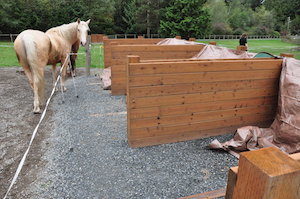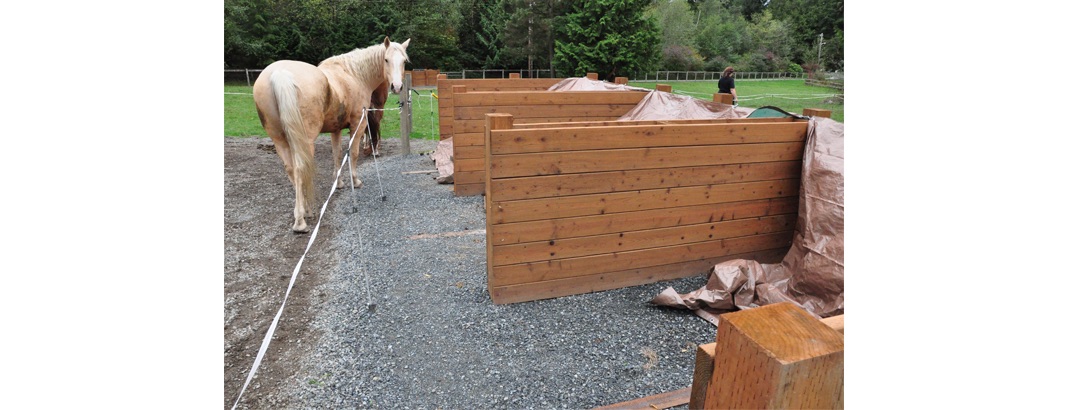Turn a Problem into an Asset
by Alayne Blickle

Manure management is such a huge issue for horse owners who care for horses on their own property. One horse produces about 50 pounds of manure per day which is over eight tons per year! Add to that the 8 to 10 gallons of urine and the wheelbarrow or more of bedding and in no time at all you have a virtual manure mountain. Plus, manure is great at holding and trapping water which means all that manure quickly turns into boot-sucking, disease-trapping mud each day — and a potential environmental hazard if nutrients, bacteria, or sediments from that manure run off your property or seep into your ground water.
Composting is by far my favorite manure management technique. The heat generated in the compost process kills worm eggs, fly larva, disease pathogens, and weed seeds. Composting also reduces odors as well as the volume of material piled up; the composting process will decrease the size of the pile by about 50% (this takes about 2 to 6 months.) Plus, it provides us with a free, easy source of compost, an important soil amendment — somewhere in the neighborhood of $500 worth per year (and no delivery fee!) I think of compost as black-gold and have so many good uses for it on my property; I never have enough of it.
Choose a site for composting based on ease of access, both for cleaning stalls as well as for getting the finished compost out and using it. Make sure the location isn’t in a wet or low area where it’ll collect too much water in the winter and that it’s well away from creeks, ponds, wetlands or other water bodies.
Some sort of cover for the manure pile is important to keep the compost pile from getting too soggy in the winter and too dried out in the summer. The site I chose on our property is under a roofed structure that we also use for hay and equipment storage. The roof on our building is helpful, but because we have so much moisture-robbing sun in our hot desert summers I also add a tarp in the summer. A cover is also critical from an eco-standpoint: it keeps the valuable nutrients in the compost so they don’t wash out and become a water pollution problem.
Composting is simple, requiring only air and water. Too much or too little of each can cause problems. I like my compost material to be about as damp as a wrung out sponge. In the summer I add water to the stall waste in the wheelbarrow before dumping it in the pile. As for air, we occasionally turn the pile with a tractor.
Compost is a rich soil enhancement that improves the health of both plants and soil and helps to retain moisture. You will know when your compost is ready when it looks evenly textured, dark, and crumbly like dirt. We spread compost in our pastures during the growing season in a thin layer, no more than a ½ inch thick anywhere so that it doesn’t smother grass plants. It can be also be used to top dress lawns, gardens or flowerbeds – or share it with horseless neighbors.
Having a manure management plan for your horse place makes your property more chore-efficient, it reduces fly habitat and mud, and it reduces the chance of your horses getting re-exposed to parasites. Learn more about composting at HorsesforCleanWater.com.
Happy composting!
Alayne
Join HCW at these upcoming educational events:
VASHON ISLAND, WA
Vashon Public Library
Thursdays, March 2, 9, 16 & 23, 6:15 pm to 8:45 pm
WORKSHOP: Land & Water Stewardship for Horse & Small Farm Owners
Hands-on workshops to help you develop and manage your livestock so you have less
mud, better pastures, effective manure strategies and healthy streams or wetlands. FREE! Light dinner food will be provided. Register: kingcd.eventbrite.com, (425) 282-1949 or signup@kingcd.org
SONOMA, CA
Saturday and Sunday, March 4 and 5, 2017
Horse and Land Management Education
Contact tcequine@earthlink.net for details or to reserve your spot.
NAMPA, ID
Sweet Pepper Ranch
Tuesday to Thursday, March 28-30 (No school days,) 8:30 am – 2 pm
Horsemanship & Swimming. Ages: 11-14. Depart & Return: Nampa Rec Center. Members $125; Non-Member $132 Register: www.nampaparksandrecreation.org or 208-468-5858
Originally Published February 2017 Issue

Alayne Blickle, a life-long equestrian and educator, is the creator/director of Horses for Clean Water, an award-winning, nationally acclaimed environmental education program that “wrote the book” on caring for horses and land. Known for her enthusiastic, fun and down-to-earth approach, she is an educator and photojournalist who has worked with horses and livestock owners for over 20 years. Alayne teaches and travels throughout North America and abroad, and also runs Sweet Pepper Ranch, an eco-sensitive guest ranch and horse motel in Southwestern Idaho where she and her husband raise top-notch reining horses and beautiful grass hay. For more information contact Alayne at alayne@horsesforcleanwater.com or 206-909-0225.

